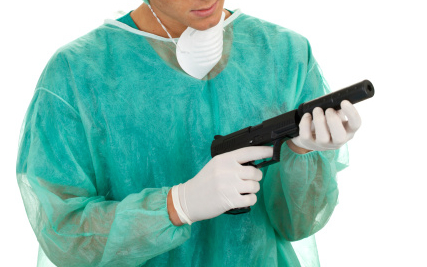Don’t I Get CME Credit for my NRA Training? I’m kind of not joking.
I’m putting in many educational hours toward obtaining my National Rifle Association Basic Pistol Instructor Certification. We’re talking a couple of hundred dollars investment, and about 20 hours of educational activity. This is a significant investment of my time and treasure in order to learn the skills needed to teach people how to safely use firearms.
Isn’t that what the American Academy of Pediatrics and other groups in Organized Medicine have been telling us that we as physicians need to do—talk to people about firearms “safety”?
So where are my Continuing Medical Education and Maintenance of Certification recognitions for this schooling? I still need more credits before I can renew my state license this summer, so 20 plus hours would really help.
But I’m not going to hold my breath. To Organized Medicine, the NRA is evil incarnate. Partnering with them to offer actual real-world training would be tantamount to making a deal with the devil. Never mind that the NRA is the leading source of firearms education in this country, teaching over a million people every year how to handle firearms safely. Not to mention its Eddie Eagle program, with its emphasis on child safety.
No, approving CME credit for actual firearms safety education and training would undermine the political message and leverage of Organized Medicine. Heaven knows we wouldn’t want politics to take a back seat to learning how to help our patients really be safer, now would we?
Well, with or without the AAP’s stamp of approval, this physician will soon be an NRA Certified Firearms Instructor.
I’m tempted to write a letter just to see. I can hear the *crickets* already.
 —“Dr. LateBloomer” is the pen name of a female general pediatrician (MD, MPH, FAAP) who enjoys competitive shooting sports, including IDPA, USPSA and 3-Gun. Evil semi-automatic firearms are her favorites.
—“Dr. LateBloomer” is the pen name of a female general pediatrician (MD, MPH, FAAP) who enjoys competitive shooting sports, including IDPA, USPSA and 3-Gun. Evil semi-automatic firearms are her favorites.
All DRGO articles by “Dr. LateBloomer”
[Editor: Annual CME is required for maintaining medical licensure in most states, usually 50 hours of activities approved by the American Medical Association or a specialty organization like the AAP. Maintenance of Certification courses are required to maintain physicians’ specialty board certification according to criteria set by the specialty organization, usually every 7 years.]

